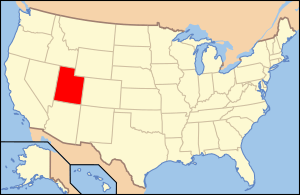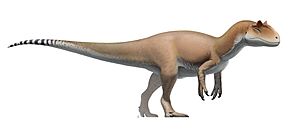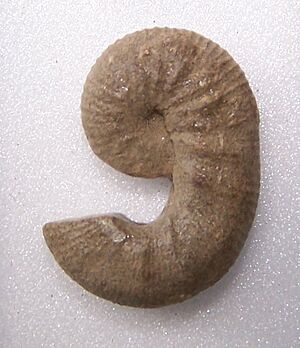Paleontology in Utah facts for kids

Paleontology in Utah is all about finding and studying fossils in the state of Utah. Utah is a super cool place for fossils because it has a huge variety of ancient life preserved in its rocks. These fossils tell us about almost every time period in Earth's history!
Millions of years ago, during the Precambrian time, parts of Utah were covered by a shallow sea. This sea was home to tiny, simple living things called microorganisms. Later, in the Paleozoic Era, Utah was still mostly underwater. These ancient seas were filled with amazing creatures like brachiopods (shellfish), early fish, and trilobites (ancient sea bugs).
Then, during the Permian period, Utah became a dry desert, much like the Sahara desert today. Here, you could find amphibians, early relatives of mammals, and reptiles. In the Triassic period, about half of Utah was covered by a sea where creatures like the cephalopod Meekoceras lived. On land, dinosaurs roamed, leaving behind their footprints that later turned into fossils.
Later, in the Jurassic period, huge sand dunes covered the land again. But during the Cretaceous period, the sea returned to Utah for the very last time. After the seas dried up, in the Cenozoic era, Utah had many large lakes. Eventually, these lakes disappeared, and the state became home to big animals like short-faced bears, bison, musk oxen, saber-toothed cats, and giant ground sloths.
Long ago, Native Americans in Utah had their own stories and myths to explain the strange fossils they found. Scientists started studying Utah's fossils in the late 1800s. One of the most famous fossil sites is the bonebeds at Dinosaur National Monument. The Jurassic dinosaur Allosaurus fragilis is even the official state fossil of Utah!
Contents
Ancient Utah: A Journey Through Time
Let's go back in time to see what Utah was like millions of years ago!
Life in Ancient Seas
During the Precambrian time, the area where the Uinta Mountains are now was a shallow sea. Simple microorganisms lived there. Then, in the Paleozoic Era, most of Utah was still covered by a shallow sea. In the Cambrian period, this sea was home to creatures like brachiopods and trilobites such as Elrathia. You can find Cambrian fossils in places like Antelope Springs and the House Range in western Utah.
Other sea creatures from the Paleozoic included algae, corals, snails, sponges, and more trilobites. The seas continued into the Carboniferous period, where almost every type of sea invertebrate (animals without backbones) could be found. Fish also swam in these waters. This time period has the most fossils found in Utah's history!
From Sea to Desert
Later, during the Permian period, eastern Utah turned into a hot, dry desert, much like the Sahara desert today. The sand and dirt from this time are now called the Cedar Mesa Formation. Scientists found an amazing fossil trackway here. It shows what might have been a hunting event from hundreds of millions of years ago!
One small set of tracks, called Stenichnus, was left by an early reptile or a small amphibian. These tracks go for a short distance and then suddenly disappear. Right where they vanish, there are much larger tracks, called Anomalopus. These bigger tracks were likely made by a pelycosaur, a type of ancient predator. It looks like the pelycosaur might have eaten the smaller animal that made the Stenichnus tracks!
Dinosaurs and Sea Monsters
As the Mesozoic Era began, sea levels in Utah dropped. Only the western half of the state was still underwater. But life in the sea was still plentiful! In Utah's Triassic seas, Meekoceras, a type of cephalopod, was very common. Many of its fossils were found near Salt Lake City in a place now called "Cephalopod Gulch."
On land, the eastern part of Utah became floodplains. There were trees similar to those found in Petrified Forest National Park. Dinosaurs also lived here, leaving behind their footprints that later became fossils.
During the rest of the Mesozoic, sea levels kept changing. In a dry period during the Jurassic, Utah was covered in huge sand dunes. Later, the sea rose again, covering much of the state. This sea was home to ammonites, brachiopods, clams, fish, marine reptiles, and snails.
On land, dinosaurs still roamed. In the Middle Jurassic, eastern Utah had crocodilians. Scientists found a small crocodile fossil in the Entrada Sandstone. This is the only body fossil of a vertebrate (animal with a backbone) found from this time in western North America! The Entrada Sandstone also has many footprints of large carnivorous dinosaurs. These footprints cover a huge area, more than 300 square miles, near Moab. This amazing site is called the Moab megatracksite.
In the Late Jurassic, a group of small to medium-sized ornithopods (plant-eating dinosaurs) left behind another important set of fossil tracks. These parallel tracks were found in the Morrison Formation, near the Arizona border. They give us important clues about how dinosaurs might have behaved in groups.
During the Cretaceous period, there was a lot of volcanic activity in Utah. This was also the last time Utah was covered by sea water. In the Early Cretaceous, Utah was home to a huge pliosaurid called Brachauchenius. One scientist called it a "true 'sea monster'" of its time! Even so, most of the fossils from this period are from land animals and plants. Later, in the Late Cretaceous, the ammonite Scaphites was very common in Utah's seas.
Lakes and Ice Age Animals
As the Cenozoic Era began, Utah's land rose up. The state also had many large lakes. Many of the animals that lived in these lakes turned into fossils. Over time, these huge lakes slowly disappeared.
The Uinta Basin, near the border with Wyoming, has fossils of bird tracks, fish, insects, and leaves from the Eocene epoch of the Cenozoic Era. Later in the Cenozoic, the land continued to rise, creating Utah's Basin and Range area.
More recently, in the Quaternary period, rivers carved out Utah's many canyons. A huge lake called Lake Bonneville formed, but then mostly dried up as the weather became drier. What's left of it today is the Great Salt Lake. During this time, Utah was home to big animals like short-faced bears, bison, musk oxen, saber-toothed cats, and giant ground sloths.
History of Fossil Discoveries
Scientific Research in Utah

One of the first big fossil-hunting trips in Utah happened in 1870. A team led by O. C. Marsh collected fossils for Yale University. Later, in 1908, a paleontologist named Earl Douglass was digging for fossils for the Carnegie Museum of Natural History. The museum's director, Mr. Holland, visited Douglass's camp.
In September, Holland suggested that Douglass look for Jurassic dinosaur fossils in the Uinta Mountains, north of his camp. Other explorers had seen dinosaur fossils there before, and Holland thought it would be a good place to search. Douglass agreed, and they went to the Uinta Mountains the next day. Together, they found a Diplodocus (a long-necked dinosaur) leg bone near the Green River.
This discovery made Douglass excited, so he went back to the Uinta Mountains the next year. He didn't find much luck in the spring and early summer. But on August 17, he found eight Apatosaurus tail bones, still connected together! When Holland heard the news, he quickly returned to the site.
Douglass built a home near the Green River, and his family moved there from Pittsburgh. He spent the rest of his career digging for fossils in that area. He found two more adult Apatosaurus skeletons and one young one. He also found parts of Allosaurus, Barosaurus, Camarasaurus, Camptosaurus, Diplodocus, Dryosaurus, and Stegosaurus. He even found fossils of a crocodile called Goniopholis and a turtle called Glyptops.
The Carnegie Museum eventually ran out of money for field work in 1922. A year later, Charles Gilmore led a trip to the area for the Smithsonian. Gilmore's team found the Diplodocus skeleton that is now on display at the Smithsonian. Later that year, the University of Utah sent another team and found an Allosaurus skull.
From 1924 to 1952, no one was digging for fossils in the area. Then, paleontologist Ted White started fieldwork again for the National Park Service. In 1915, US president Woodrow Wilson made the fossil quarry and the land around it a Dinosaur National Monument. This was to protect it from people building on it. Between 1909 and 1923, millions of tons of rocks and fossils were dug up from the Dinosaur National Monument area. In 1958, the building over the Dinosaur National Monument quarry was finally finished. Later, in 1988, the Jurassic dinosaur Allosaurus fragilis was named the official state fossil of Utah.
Protected Areas
- Dinosaur National Monument - A special place where many dinosaur fossils are protected.
Natural History Museums
If you want to see some of Utah's amazing fossils and learn more, check out these museums!
- BYU Earth Science Museum, Provo
- College of Eastern Utah Prehistoric Museum, Price
- John Hutchings Museum of Natural History, Lehi
- Monte L. Bean Life Science Museum, Provo
- Museum of Moab, Moab
- Museum of the San Rafael, Castle Dale
- Natural History Museum of Utah, Salt Lake City
- North American Museum of Ancient Life, Lehi
- St. George Dinosaur Discovery Site at Johnson Farm, St. George
- The Dinosaur Museum, Blanding
- Union Station Natural History Museum, Ogden
- Utah Field House of Natural History, Vernal
- Weber State University Museum of Natural Science, Ogden
 | Mary Eliza Mahoney |
 | Susie King Taylor |
 | Ida Gray |
 | Eliza Ann Grier |


